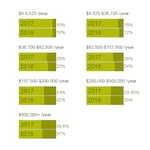Tax time. Ugh.
This year's a little different though. The Tax Cuts and Jobs Act (TCJA), the tax law President Trump and the GOP passed in December 2017, changes things for just about everybody.
Here’s a big-picture overview for folks who don’t like thinking about taxes.
Does The TCJA Mean You'll Get More Money Back This Year?
No. The changes under the TCJA go into effect for the money you make in 2018.
So What Does It Do?
The TCJA cuts tax rates and changes how much of your money gets taxed. There are a bunch of other details, but those are the two big things.
It means most folks in Oregon will get to keep a little extra money from each paycheck. Some will get a lot. Some will end up owing more. Here’s why:
Imagine this is all the money you’ll make in 2018.

Not all of that money gets taxed. The government lets you set aside some money each year in the form of deductions and exemptions.

To find out how much of that money you actually pay, you need the tax rate.

Your total tax bill then depends on how much gets taxed and the rate.

Right, That’s How Taxes Work, But What Does The TCJA Do?
The TCJA lowers the tax rate for most people.

It also changes how much money gets taxed. It doubles the amount that everyone gets to set aside, no questions asked. That's the standard deduction.

But it gets rid of money that you used to be able to set aside based on how many people are in your household. Those are exemptions.

This means, for example, that families with multiple children may have more of their money taxed than before.
Not everyone takes the standard deduction though. If you own your home and have a mortgage, or you live in a high tax city or county, those expenses can add up to be more than the standard deduction. Those are called itemized deductions.

The TCJA limits how much you can set aside for things like mortgage interest or state and local taxes. But it increases how much you can set aside for some medical expenses. Taken all together, many taxpayers who currently itemize may find it harder to beat the standard deduction.

The caps to itemized deductions mean some people may have more of their money subject to tax than before the TCJA.
Doesn’t This Mean Everyone Saves Money?
Most Oregonians will keep more money.

Source: ITEP
But, according to calculations by the Institute For Taxation and Economic Policy (ITEP), a non-partisan think tank based in Washington, D.C., almost 400,000 Oregon taxpayers will pay the same amount they do now or owe more.
How is that possible?
If your rate goes down AND the amount that gets taxed goes down, you owe less money. This is what the TCJA does for most people who just take the standard deduction.

If the tax rate goes down and the amount that gets taxed stays the same, you’ll still owe a little less money. This could happen for folks who usually itemize, depending on what their specific deductions are.

But if your rate goes down and the amount that gets taxed goes up, you could owe slightly less, the same as you do now or more, even though the tax rate has gone down.

This could happen, for example, if you have a lot of deductions for mortgage interest and state and local taxes. If those used to add up to more than the new standard deduction, but now don’t, the amount that gets taxed could be larger. This applies to about 1 in 10 Oregonians, according to ITEP calculations.

What About My Oregon State Tax? Will It Be Affected?
Possibly. Oregon’s income tax rate stays the same at 9 percent, but since it uses the federal rules to determine how much gets taxed, your Oregon tax bill could change.
Does The TCJA Mean I’ll Get A Raise? Or Maybe A Better Job?
This is the trillion-dollar question. The TCJA significantly cuts the corporate tax rate and changes the way companies with international business pay U.S. taxes.

Both of those changes mean corporations will have more money. President Trump and GOP lawmakers say that money will go to raise wages and create jobs. So … will it?
Some companies have already announced bonuses and wage increases. Others have said they plan to use the money to instead reward shareholders either by paying them directly, through dividends, or buying back stock, which can raise its price.
A 2011 Congressional Research Service study looked at how corporations responded to the 2004 American Jobs Creation Act, passed under the George W. Bush administration. The act reduced taxes on corporations bringing money earned overseas back to the U.S.
Ten of the 15 companies benefiting most from that act actually reduced jobs in the following three years. Some companies did invest the money to create jobs but others passed along the extra money to shareholders. One study estimated that on the whole, about 20 percent of the money was used to buy back stock.
Another study of the 2003 Homeland Investment Act, a similar corporate tax break, found that for each dollar a company gained through the act, stock buybacks increased by about 90 cents. Overall, the Congressional Research Service found the tax cuts under these acts were an "ineffective means of increasing economic growth."
Kimberly Clausing, an economist at Reed College in Portland, Oregon, who studies how multinational corporations respond to tax changes puts it more succinctly, "It's a good time to be a shareholder."
What’s The Takeaway?
The majority of Oregonians will save some money on their taxes in 2018-19. But about 1 in 10 will see no change, or even owe more.
Recent history suggests it is unlikely that the TCJA will lead to significant raises or more jobs, but it is possible.
